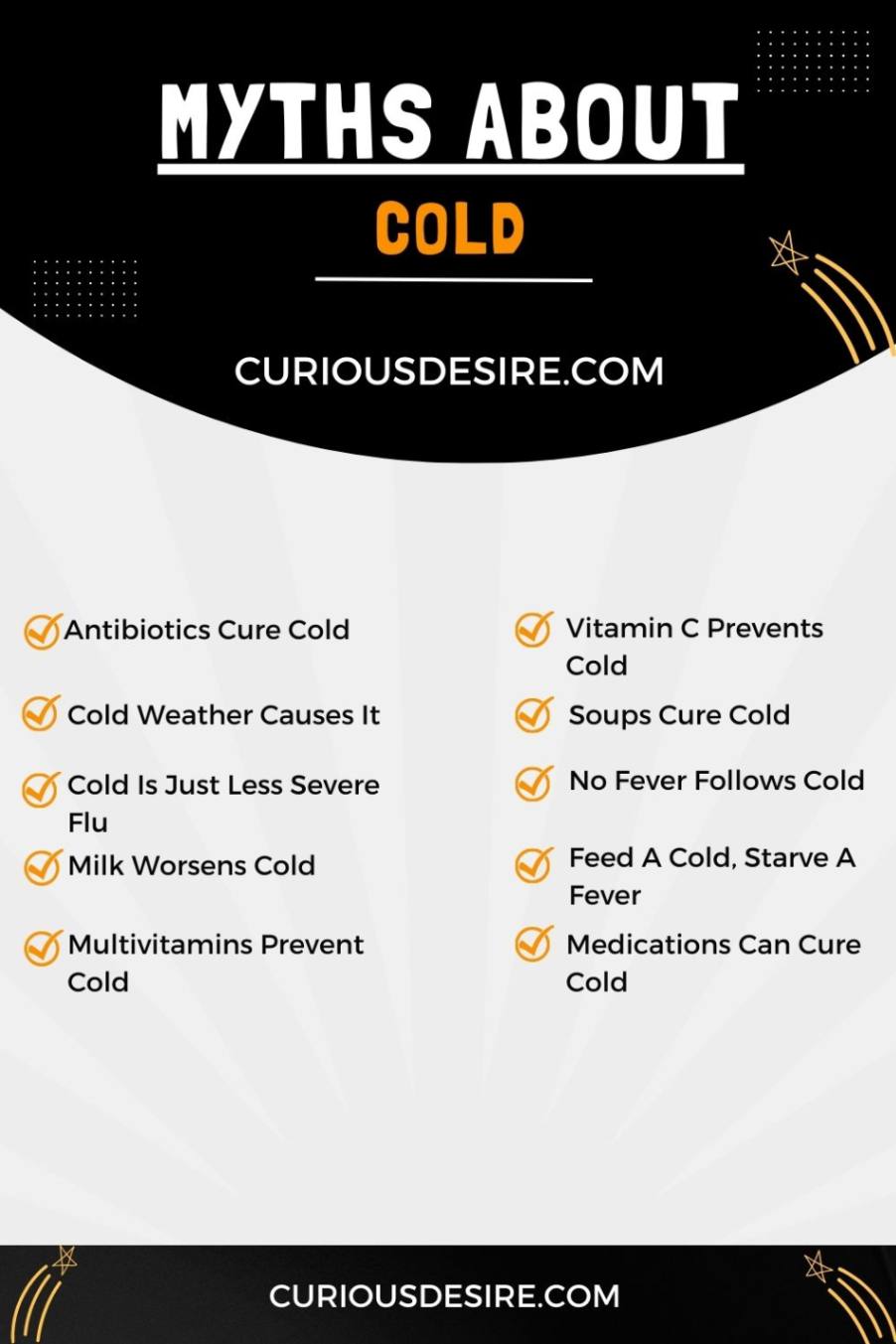Are you among the countless people affected by the common cold yearly?
If you’re fed up with the overwhelming amount of misinformation and the myths about the common cold shared in WhatsApp groups, and are looking for the facts, you’ve landed in the right spot.
Keep reading to uncover the truth and dispel the myths.
5 Most Common Myths About Cold
- Antibiotics treat colds
- Vitamin C prevents colds
- Cold weather causes colds
- You can’t catch a cold in the summer
- Soup cures colds

Myth 1: Antibiotics Are Effective in Treating Colds
Why this Myth Exists:
This is one of the most famous myths about colds that has persisted for years despite being thoroughly debunked by medical professionals.
The lack of understanding of the differences between viral and bacterial infections, as well as the over-prescription of antibiotics in clinical practice has given rise to this baseless myth.
Debunking The Myth:
A common cold is a viral infection. There are over 200 different viruses that can cause the common cold. Antibiotics, however, are designed to combat bacterial infections, not viral ones.
They are powerless against viruses because viruses operate differently from bacteria and do not possess the same vulnerabilities that antibiotics can target. This is high time you stop taking antibiotics to treat colds.
Myth 2: Vitamin C Prevents Colds
Why This Myth Exists:
The myth that vitamin C is a miracle cure for colds is fueled by the mixed results of scientific studies conducted to investigate the effects of vitamin C on the prevention and treatment of colds.
For instance, a review of several clinical trials concluded that regular supplementation with vitamin C can reduce the duration and severity of colds.
Debunking The Myth:
There is no conclusive evidence to support the idea that vitamin C can cure or prevent the common cold. It may provide you some benefits but it is not a cure-all or a guaranteed preventive measure for the common cold.
Additionally, the overall impact of vitamin C on colds varie. Some people may experience a reduction in the severity or duration of a cold, others may not notice any significant difference.
Myth 3: Cold Weather Causes Colds
Why This Myth Exists:
This myth has been widely believed for generations, but the time has come to debunk this misconception.
The reason behind the existence of this myth is the fact that there is an increase in colds during the winter months when the temperature is cold.
Debunking The Myth:
Contrary to popular belief, cold weather doesn’t cause cold. This widely-held myth doesn’t align with scientific evidence. It is caused by viruses, not by exposure to cold temperatures. The outbreak of this disease in regions with consistently warm temperatures also debunks this myth.
Source: Demystifying Medicine McMaster YT Chanel
Myth 4: Cold Is Nothing More Than a Less Severe Form of Flu
Why This Myth Exists:
This is one of the most common myths about cold. It is shaped by the fact that both are respiratory diseases. While the common cold and the flu share some symptoms, they are caused by different viruses and can have different levels of severity and potential complications. It’s important to understand the differences between the two to take appropriate precautions and seek proper medical care when necessary.
Debunking The Myth:
This myth can cause confusion and misunderstanding about these two distinct illnesses. We have debunked this myth effectively by stating the obvious differences below between a cold and the flu
- Nature of Illness: The common cold is primarily caused by rhinoviruses, while the flu is caused by influenza viruses. Both have different symptoms and health impacts.
- Severity of Symptoms: The common cold typically presents with milder symptoms such as a runny or stuffy nose, sneezing, sore throat, and mild cough. On the other hand, the flu often causes more severe symptoms including high fever, muscle aches, extreme fatigue, headache, and weakness.
- Duration: Cold symptoms can last for about 7-10 days on average. Symptoms of flu tend to last for a long duration, sometimes up to two weeks or more.
Myth 5: Soups Cure Colds
Why This Myth Exists:
The tradition of using chicken soup to treat colds has been ingrained in families for ages. It is believed by our elders that soup decreases the severity of cold. Despite its popularity, the concept of using a soup to alleviate cold symptoms lacks any basis in medical reality.
Debunking The Myth:
The common cold is caused by a viral infection and not by the deficiency of a soup. So it is necessary to debunk the myth that soup can outright cure the common cold.
A nutritious diet can support a healthy immune system, but there is no scientific evidence to suggest that a particular soup, has any unique ability to combat the cold virus.
Here’s hoping that your warm cup of soup brings you endless joy, even though it won’t cure your cold.

Myth 6: Colds Do Not Cause Fever
Why This Myth Exists:
The misconception that colds do not cause fever persists because of misunderstanding of the different types of infections and their associated symptoms.
The misconception also arises from the fact that the flu, which is caused by a different virus than the common cold, more commonly presents with fever as a symptom.
Debunking The Myth:
The symptoms of the common cold vary from person to person. While a runny nose, sneezing, and congestion are common, fever can also occur. It is important for you to be aware of this possibility and to monitor your symptoms accordingly. Fever is a common symptom in children.
According to research, about 25% of children who experience a fever during the winter months have an underlying cold virus.
Myth 7: Drinking Milk Will Worsen Your Cold
Why This Myth Exists:
In our society, cultural beliefs and anecdotal experiences play a significant role in shaping health-related myths. The myth that drinking milk worsens a cold has been around for quite some time, but it is important to understand that there is no scientific evidence to support this claim.
This myth may arise from the widely believed notion that milk induces mucus which leads to congestion.
Debunking The Myth:
Many people believe that milk can make a cold worse because dairy products are thought to induce the production of mucus, which can lead to congestion and discomfort. However, numerous scientific studies have shown that this is not the case.
In 2005, a study published in the American Journal of Respiratory and Critical Care Medicine found no significant association between milk consumption and mucus production in healthy volunteers. Furthermore, it’s important to note that milk and dairy products contain essential nutrients that can support the immune system and overall health.
Myth 8: Feed a Cold, Starve a Fever
Why This Myth Exists:
This myth, which has been passed down through generations, is based on the assumption that feeding a cold will help raise body temperature while fasting during a fever will help lower it.
However, many modern medical professionals and researchers have debunked this myth, emphasizing the importance of proper nutrition and hydration in both scenarios.
Debunking The Myth:
This is one of the most prevalent myths about cold which needs to be dispelled. Our bodies require essential nutrients and sufficient energy to combat infections and support immune function, regardless of whether we are experiencing a cold or a fever.
Fasting during a fever can deprive your body of the resources it needs to fight off the infection. Similarly, eating during a cold can provide your body with the necessary fuel and nutrients to support recovery and overall well-being.
For individuals with a cold or fever, here are some general guidelines for maintaining proper nutrition and hydration:
- Hydration: Whether you have a cold or a fever, staying well-hydrated is essential. Drinking plenty of fluids helps to thin mucus and lubricate the respiratory tract, making it easier for you to cough and clear your airways.
- Nutrition: Consuming nutrient-rich foods can help support the immune response and provide your body with the energy it needs to fight off infections. Foods high in vitamins, minerals, and antioxidants can be particularly beneficial.
- Rest: Regardless of whether you have a cold or a fever, getting plenty of rest is crucial for allowing the body to focus its energy on fighting off the underlying illness.
Myth 9: Multivitamins and Supplements Can Prevent Cold
Why This Myth Exists:
The belief that regularly consuming multivitamins or specific supplements can shield the body from catching a cold has been kept alive by marketing and human’s general desire for quick preventive measures.
Multivitamins and supplements provide temporary belief, which leads people to believe that they can prevent colds. The common cold is caused by viruses and no supplement can provide you absolute immunity against viruses.
Debunking The Myth:
Scientific evidence does not support the notion that multivitamins and supplements prevent the common cold. Studies published in the Cochrane Database of Systematic Reviews found no evidence in support of the prevalent myth that multivitamins prevent the common cold in the general population
It’s important to address the potential risks associated with excessive vitamin and mineral intake. In some cases, the mega doses of certain vitamins found in supplements can lead to adverse effects and toxicity. For example, excessive vitamin C intake can cause gastrointestinal upset and diarrhea.
Take multivitamins as prescribed by your doctor.
Myth 10: Medications Can Cure Cold
Why This Myth Exists:
The myth that medications can cure the common cold is arguably the most prevalent of all the myths about cold. It is rooted in a misunderstanding of the viral nature of the illness.
Another contributing factor to the persistence of this myth is the placebo effect. It states that when individuals believe strongly in the efficacy of a medication, they may experience a subjective improvement in symptoms due to psychological factors.
Debunking The Myth:
A common cold has no known cure, but taking medications can alleviate symptoms such as fever and body aches. The only true remedy for a cold is rest, staying hydrated, and giving it time to run its course.
Unlike bacterial infections, which can be treated with antibiotics, viral infections do not respond to these medications.
- Viral nature of the common cold: Colds are caused by a variety of viruses, and antibiotics, which are often erroneously used for treating colds, are ineffective against viruses. Using antibiotics in the absence of a bacterial infection can contribute to the growing problem of antibiotic resistance.
- Potential side effects: Over-the-counter cold medications can have side effects, especially when they are not used as directed. Some common side effects include drowsiness, dizziness, increased heart rate, upset stomach, and drug interactions.
- Impact on immune response: Suppressing symptoms with medications may interfere with the body’s natural immune response to the virus.
- Natural course of the illness: Colds typically run their course over a few days to a week. In most cases, the body’s immune system can clear the infection without the need for specific antiviral medications.
Conclusion
The common cold is the leading cause of doctor visits and missed days from school and work. About 40% of time lost from work and 30% of school absences are due to the common cold.
By debunking these myths about the cold, we pave a path for a society that is more prepared to navigate the obstacles of the cold season with understanding and a commitment to overall wellness.

Cold Myths FAQs
1. Can we get cold in summer?
Yes, you can get cold in summer. While colds are more common in the winter, it’s still possible to get a cold in the summer. Viruses responsible for colds can be active year-round.
Symptoms of the common cold include a runny or stuffy nose, sore throat, sneezing, coughing, and sometimes a low-grade fever. Symptoms last for usually 7-8 days.
3. Can elderly people catch colds?
Elderly people are still susceptible to colds, and their immune systems may not respond as robustly to infection, making them more vulnerable to complications. This is one of the most common myths about colds that elder people do not catch colds.
4. Are antibiotics effective in treating colds?
No, antibiotics are not effective against the viruses that cause the common cold. They only work against bacterial infections. It’s advisable not to use antibiotics while treating colds.
5. Are we contagious with cold once symptoms disappear?
You can remain contagious for up to two weeks after the onset of cold symptoms, even if you feel better. Good hygiene practices are crucial to prevent the spread of the virus.
6. Is it possible to get a cold in the summer?
Yes, although the common cold is more prevalent in the fall and winter, it is still possible to catch a cold in the summer months.
7. Is the common cold the same as the flu?
No, the common cold is caused by different and is dissimilar to flu. While both may have similar symptoms, the flu tends to be more severe and can lead to complications.
8. Can I catch a cold from eating cold food or drinking cold drinks?
Cold food and drinks themselves do not cause the common cold. However, practicing good hygiene and avoiding sharing utensils can help reduce the risk of spreading viruses.